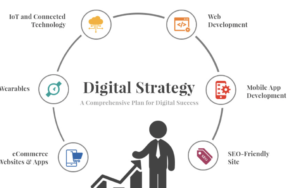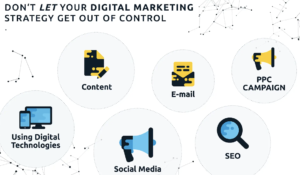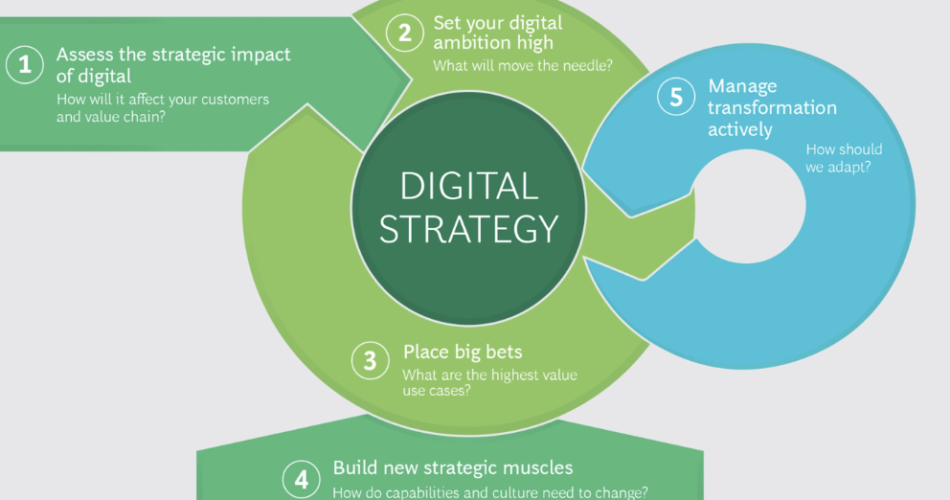As an experienced digital marketing professional, I understand the importance of having a well-crafted digital strategy. In today’s rapidly evolving digital landscape, a comprehensive and adaptable digital strategy is essential for businesses to thrive and stay ahead of the competition. In this article, I’ll guide you through the key elements of a successful digital strategy, empowering you to unlock your full potential in the digital realm.
Contents
- 1 Why is a Digital Strategy Important?
- 2 Understanding Your Target Audience
- 3 Setting Goals for Your Digital Strategy
- 4 Conducting a SWOT Analysis for Your Digital Strategy
- 5 Identifying Key Digital Channels for Your Strategy
- 6 Creating a Content Marketing Plan
- 7 Optimizing Your Website for Search Engines
- 8 Utilizing Social Media for Your Digital Strategy
- 9 Email Marketing and Automation
- 10 Measuring and Tracking Your Digital Strategy
- 11 Adapting and Adjusting Your Digital Strategy
- 12 Case Studies of Successful Digital Strategies
- 13 Conclusion and Key Takeaways
Why is a Digital Strategy Important?
A digital strategy is the backbone of your online presence. It serves as a roadmap, helping you navigate the complex world of digital marketing and ensure that your efforts are aligned with your business goals. By having a clear digital strategy, you can effectively leverage digital channels to reach your target audience, increase brand awareness, generate leads, and drive conversions.

digital strategy
Understanding Your Target Audience
The foundation of any successful digital strategy lies in understanding your target audience. Who are they? What are their pain points, interests, and preferences? Conducting thorough market research and creating detailed buyer personas will enable you to tailor your digital initiatives to their specific needs, ensuring maximum engagement and impact.
Setting Goals for Your Digital Strategy
Before embarking on your digital journey, it’s essential to establish clear, measurable goals. These goals should be SMART (Specific, Measurable, Achievable, Relevant, and Time-bound) and aligned with your overall business objectives. Whether it’s increasing website traffic, generating more leads, or improving customer retention, setting well-defined goals will help you track your progress and make data-driven decisions.
Conducting a SWOT Analysis for Your Digital Strategy
Conducting a SWOT (Strengths, Weaknesses, Opportunities, Threats) analysis is a critical step in developing your digital strategy. By identifying your internal strengths and weaknesses, as well as the external opportunities and threats, you can gain a comprehensive understanding of your digital landscape. This analysis will inform your strategic decisions and help you capitalize on your strengths while mitigating potential risks.
Identifying Key Digital Channels for Your Strategy
With the vast array of digital channels available, it’s crucial to identify the ones that align best with your target audience and business goals. This may include a combination of search engine optimization (SEO), social media, email marketing, content marketing, and more. By focusing on the most relevant channels, you can optimize your resources and maximize the impact of your digital initiatives.
Creating a Content Marketing Plan
Content marketing is the backbone of a successful digital strategy. By creating valuable, engaging, and informative content, you can attract and retain your target audience, establish your brand as an industry authority, and drive meaningful interactions. Develop a content calendar that aligns with your goals, and leverage various content formats, such as blog posts, videos, infographics, and social media updates, to reach your audience effectively.
Optimizing Your Website for Search Engines
In the digital age, a well-optimized website is essential for driving organic traffic and enhancing your online visibility. Implement best practices for on-page SEO, including keyword research, meta-tag optimization, and content structure. Additionally, ensure your website is mobile-friendly, fast-loading, and user-friendly to provide an exceptional experience for your visitors.
Utilizing Social Media for Your Digital Strategy
Social media platforms have become powerful tools for connecting with your target audience, building brand awareness, and driving engagement. Develop a strategic social media plan that identifies the most relevant platforms for your business, creates compelling content, and leverages paid advertising opportunities to amplify your reach.
Email Marketing and Automation
Email marketing remains a highly effective digital strategy, allowing you to nurture leads, foster customer loyalty, and drive conversions. Implement a robust email marketing and automation system to segment your audience, personalize your communications, and automate your outreach efforts for maximum impact.
Measuring and Tracking Your Digital Strategy
Continuous monitoring and evaluation are crucial for the success of your digital strategy. Utilize analytics tools and dashboards to track key performance indicators (KPIs) that align with your goals, such as website traffic, conversion rates, and return on investment (ROI). Regularly analyze this data to identify areas for improvement and make data-driven decisions that optimize your digital initiatives.
Adapting and Adjusting Your Digital Strategy
The digital landscape is constantly evolving, and your strategy must be agile and adaptable to keep pace. Regularly review and update your strategy based on changing market trends, customer behavior, and the performance of your digital initiatives. Be prepared to pivot your approach when necessary to ensure your digital strategy remains effective and relevant.
Case Studies of Successful Digital Strategies
To further illustrate the power of a well-executed digital strategy, let’s explore a few case studies of businesses that have achieved remarkable success:
- E-commerce Retailer: A leading online retailer implemented a comprehensive digital strategy that included SEO optimization, targeted social media campaigns, and personalized email marketing. As a result, they experienced a 35% increase in website traffic, a 25% boost in conversion rates, and a 40% growth in revenue.
- SaaS Company: A software-as-a-service (SaaS) company developed a content-driven digital strategy that positioned them as thought leaders in their industry. By consistently publishing high-quality blog posts, videos, and webinars, they were able to attract a significant number of qualified leads, resulting in a 50% increase in customer acquisition.
- Local Service Provider: A local service provider leveraged a combination of local SEO, Google My Business optimization, and targeted social media advertising to reach their community. This strategy led to a 45% increase in website leads and a 30% growth in their customer base.
These case studies demonstrate the tangible benefits of a well-crafted digital strategy, and they can serve as inspiration as you embark on your own digital transformation journey.

digital strategy
Conclusion and Key Takeaways
In conclusion, a comprehensive strategy is essential for businesses of all sizes to thrive in the digital age. By understanding your target audience, setting clear goals, leveraging the right digital channels, and continuously measuring and adapting your approach, you can unlock the full potential of your digital initiatives and drive sustainable growth for your business.
